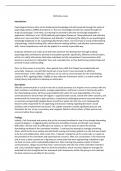Essay
Critically reflect on how your undergraduate degree course has developed you to become a ‘Psychologically Literate Citizen’.
- Institution
- Nottingham Trent University (NTU)
an essay by selecting one or more of the attributes mentioned by McGovern (for example, problem-solving, critical evaluation of information, and ethical acting). In this reflective essay, I reflect on and analyse the development of becoming a psychologically literate citizen from my degree course...
[Show more]



